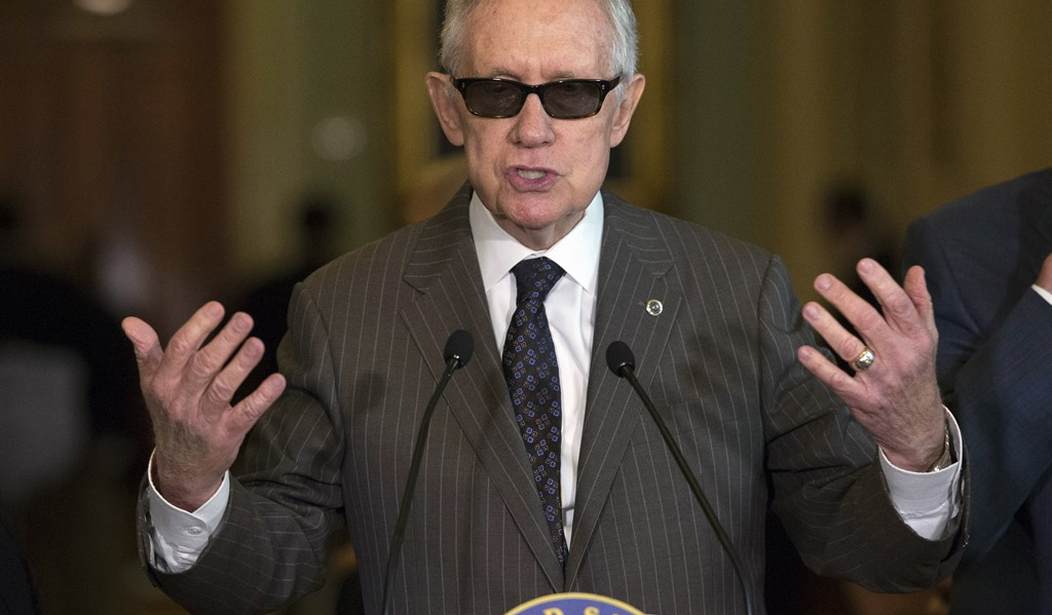Reid was previously "undecided" on the nuclear agreement, but nobody believed that for a second. The man's a bare-knuckled partisan whose top legislative feat was whipping his entire caucus into walking the plank on Obamacare, willingly sacrificing his own majority in service to Obama's agenda. Reid is finally retiring after years of faithful, arduous water-carrying; the likelihood that he'd snub O's geopolitical legacy gambit on his way out the door was always nil. And now -- ta-da -- Reid is emphatically off the fence, upon which he was never perched in the first place:
President Barack Obama’s nuclear deal with Iran just won the backing of the Senate’s top Democrat. Senate Minority Leader Harry Reid of Nevada said Sunday that he “strongly” supports the agreement reached by six world powers and Iran meant to curb Tehran’s nuclear ambitions – vowing that he will do “everything in my power” to defend the deal. “At the end of the day, there is no doubt in my mind that the threat of Iran gaining a nuclear weapon — the one outcome we all agree is unacceptable — is far more likely if Congress rejects this agreement,” Reid said in a lengthy statement explaining his support for the nuclear deal. The backing from the Senate’s most powerful Democrat adds even more momentum on Capitol Hill to protect the nuclear agreement. Reid becomes the 27th Senate Democrat to formally endorse the Iran deal, and Obama needs just 34 votes in the Senate to sustain a veto of a resolution of disapproval that is expected in Congress next month.
Headline: Committed Ideologue 'Strongly' Confirms Unwavering Commitment. Another Senate Democrat has since announced her intention to vote for the agreement, bringing the total of on-the-record Senate supporters to 28. Barring an unforeseen turn of events, Democrats will muster the votes to sustain an Obama veto -- a bar set very low by the White House's
Recommended
Stabenow is close to Schumer. If he were whipping against Iran deal, this is a vote he'd want. Fact that Stabenow backs Obama is telling
— John Bresnahan (@BresPolitico) August 24, 2015Schumer has genuine reservations about the deal on the merits, and understands the politics of his home state, so he was willing to cross Obama on the issue. But he doesn't appear to be pressuring persuadable members to join him in opposition. He isn't going to the mat on this, unlike some of his fellow Democrats. But let's face it: If (a) Iran's significant increase of its nuclear stockpile during the program's mid-negotiations "freeze," (b) the deal's weak inspections protocols and additional side agreement concessions, and (c) powerful appeals from victims of Iran's anti-American terrorism weren't enough to convince wavering members to reject the deal, nothing could have. Speaking of verification, the New York Times reports that senior administration officials now regret promising "anytime, anywhere" inspections, a standard they employed to drum up support for the ongoing negotiations, then
Iran on Saturday unveiled a new surface-to-surface missile it said could strike targets with pin-point accuracy within a range of 500 km (310 miles) and it said military might was a precondition for peace and effective diplomacy...Iran has said it will not follow parts of the nuclear deal that restricts its military capabilities, a stance reaffirmed by President Hassan Rohani on Saturday. "We will buy, sell and develop any weapons we need and we will not ask for permission or abide by any resolution for that," he said in a speech at the unveiling ceremony broadcast live on state television.
So Tehran is actively ignoring restrictions attached to terms that were added on as Western concessions at the eleventh hour. I'll leave you with Judith Miller and William Tobey arguing that the full text of Iran's secret side deals with the IAEA ought to be made public -- which US law requires, by the way:
First, Iran’s commercial and industrial secrets—or even military secrets—are unlikely to be revealed by publishing the IAEA’s side agreements. Confidentiality regarding safeguards mainly covers proprietary and economic information, not approaches, said Olli Heinonen, the IAEA’s former chief inspector. Second, while such side deals are normally secret, the Iran agreement is far from a normal case. Both the IAEA Board of Governors and the United Nations Security Council concluded that Tehran violated its earlier Safeguards obligations on numerous occasions over an extended period of time. Moreover, Iran, under its earlier commitments, was supposed to let the IAEA visit Parchin with 24 hours’ notice. Yet the agency has been waiting years for access, while Iran has conducted a massive cleanup at the location. Third, the overarching deal removing sanctions on Iran was struck by seven nations and the European Union—not just by Iran and the IAEA. Understanding how the IAEA and Teheran intend to resolve differences over the possible military dimensions of Iran’s program and ensuring access to suspect sites are crucial to evaluating the overall agreement.
These are our new peace partners, upon whom Barack Obama is preparing to bestow an internationally-legitimized nuclear weapons program, just as soon as this agreement's restrictions begin to automatically expire -- a point that even many of the deal's supporters are now
New Fox poll shows nearly 2-to-1 public opposition to #IranDeal ... Tracks with Gallup & Q-poll.
Heckuva sales pitch, WH.
— Guy Benson (@guypbenson) August 14, 2015
























Join the conversation as a VIP Member